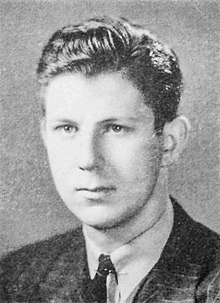
Back آرون بيك Arabic آرون تمکین بک AZB Аарон Бек Byelorussian Аарън Бек Bulgarian Aaron Beck Catalan Aaron T. Beck Czech Aaron T. Beck German Άαρον Μπεκ Greek Aaron T. Beck Spanish Aaron T. Beck Estonian
Aaron Beck | |
|---|---|
 Beck in 1942 | |
| Born | Aaron Temkin Beck July 18, 1921 Providence, Rhode Island, U.S. |
| Died | November 1, 2021 (aged 100) Philadelphia, Pennsylvania, U.S. |
| Alma mater | |
| Known for | Beck Depression Inventory |
| Spouse |
Phyllis W. Beck (m. 1950) |
| Children | 4, including Judith |
| Awards | See list |
| Scientific career | |
| Fields | Psychiatry |
| Institutions | University of Pennsylvania Beck Institute for Cognitive Behavior Therapy |
| Doctoral students | Steven D. Hollon Jeffrey Young Gregg R. Henriques |
Aaron Temkin Beck (July 18, 1921 – November 1, 2021) was an American psychiatrist who was a professor in the department of psychiatry at the University of Pennsylvania.[1][2] He is regarded as the father of cognitive therapy[1][2][3] and cognitive behavioral therapy (CBT).[4] His pioneering methods are widely used in the treatment of clinical depression and various anxiety disorders. Beck also developed self-report measures for depression and anxiety, notably the Beck Depression Inventory (BDI), which became one of the most widely used instruments for measuring the severity of depression.[5] In 1994 he and his daughter, psychologist Judith S. Beck, founded the nonprofit Beck Institute for Cognitive Behavior Therapy, which provides CBT treatment and training, as well as research.[6] Beck served as President Emeritus of the organization up until his death.
Beck was noted for his writings on psychotherapy, psychopathology, suicide, and psychometrics. He published more than 600 professional journal articles, and authored or co-authored 25 books.[7] He was named one of the "Americans in history who shaped the face of American psychiatry", and one of the "five most influential psychotherapists of all time"[8] by The American Psychologist in July 1989. His work at the University of Pennsylvania inspired Martin Seligman to refine his own cognitive techniques and later work on learned helplessness.[9]
- ^ a b 2004 - Aaron Beck Archived June 6, 2016, at the Wayback Machine, The Grawemeyer Awards, Louisville, KY: University of Louisville/Louisville Presbyterian Theological Seminary, 2009, Retrieved February 21, 2014.
- ^ a b Aaron Beck bio, The Heinz Awards Undated, Retrieved February 21, 2014.
- ^ Beck, Judith S.; Fleming, Sarah (June 18, 2021). "A Brief History of Aaron T. Beck, MD, and Cognitive Behavior Therapy". Clinical Psychology in Europe. 3 (2): e6701. doi:10.32872/cpe.6701. ISSN 2625-3410. PMC 9667129. PMID 36397957. S2CID 237383023.
- ^ Folsom, Timothy D., et al. "Profiles in history of neuroscience and psychiatry." The Medical Basis of Psychiatry. Springer, New York, NY, 2016. 925-1007.
- ^ Beck, A.T.; Ward, C.H.; Mendelson, M.; Mock, J.; Erbaugh, J. (June 1961). "An inventory for measuring depression". Archives of General Psychiatry. 4 (6): 561–571. CiteSeerX 10.1.1.934.7580. doi:10.1001/archpsyc.1961.01710120031004. PMID 13688369. S2CID 40145105.
- ^ About Beck Institute: Leadership Archived December 21, 2015, at the Wayback Machine, Beck Institute for Cognitive Behavior Therapy, Bala Cynwyd, PA: Beck Institute for Cognitive Behavior Therapy, 2014, Retrieved February 21, 2014.
- ^ "Department of Psychiatry: Aaron T. Beck, M.D." September 14, 2017. Archived from the original on September 14, 2017. Retrieved March 19, 2018.
- ^ Talbott, J.A. (2002). "Dix Personalité Qui Ont Changé le Visage de la Psychiatric Américaine". L'Information Psychiatrique. 78 (7): 667–675.
- ^ Hirtz, R. (1999). Martin Seligman's journey: From learned helplessness to learned happiness, The Pennsylvania Gazette, Philadelphia, PA: University of Pennsylvania, January/February 1999, Retrieved February 21, 2014.